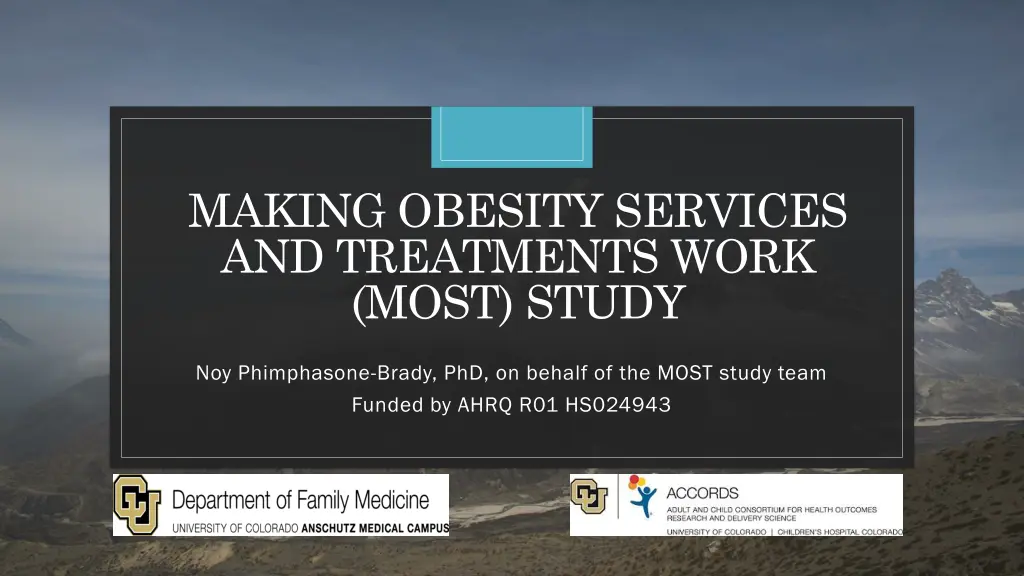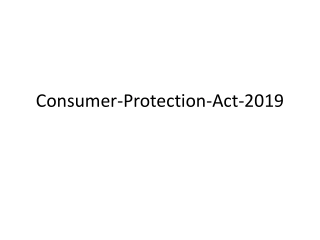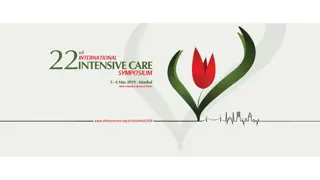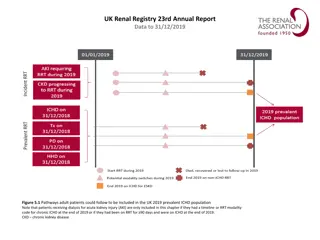
Understanding Medicare Intensive Behavioral Therapy for Obesity
Explore the research findings and insights from the MOST study on making obesity services and treatments work effectively. Learn about the utilization of Medicare IBT, strategies for obesity care, and primary care practices' involvement in addressing obesity.
Download Presentation

Please find below an Image/Link to download the presentation.
The content on the website is provided AS IS for your information and personal use only. It may not be sold, licensed, or shared on other websites without obtaining consent from the author. If you encounter any issues during the download, it is possible that the publisher has removed the file from their server.
You are allowed to download the files provided on this website for personal or commercial use, subject to the condition that they are used lawfully. All files are the property of their respective owners.
The content on the website is provided AS IS for your information and personal use only. It may not be sold, licensed, or shared on other websites without obtaining consent from the author.
E N D
Presentation Transcript
MAKING OBESITY SERVICES AND TREATMENTS WORK (MOST) STUDY Noy Phimphasone-Brady, PhD, on behalf of the MOST study team Funded by AHRQ R01 HS024943
OVERVIEW THE PROBLEM HOW WE STUDIED THIS PROBLEM WHAT WE FOUND LESSONS LEARNED NEXT STEPS
Medicare Intensive Behavioral Therapy (IBT) for obesity benefit G0447 (Individual) G0473 (Group) Month 1, weekly in-person visits Month 2, bi-monthly in-person visits Months 7-12, monthly in-person visit Must lose 3kg (6.6 lbs) in first 6 months to continue 10-15 minute visits Reimbursement rates: $26 (for individual visits); $13 (for group visits)
Received obesity services (2012) 0% (n = 28,135) Received obesity services (2015) 1% (n = 80,333) Eligible for obesity-related services 99% (n = 12,274,000) Less than 1% of use of IBT benefit
GOALS Understand the use/non use of Medicare IBT Learn strategies and models of obesity care in action
Primary care practices in 14 states selected regionally that submitted claims >10 Medicare beneficiaries per year between 2012-2016; plus random selection of those not submitting claims at this level Primary care practices in Practice Based Research Networks and Professional Organizations Phase 1 Written survey - mailed or online (N = 291) Semi-structured telephone interviews (N = 85) Specific phase 1 practices (N = 20) selected for in-depth visit during phase 2: On site observations of obesity care in action (patient visits) In-depth interviews with providers and staff Cost and resources interview Clinical and reimbursement data from EMR/billing system Phase 2
PHASE 1 SUBMITTED CLAIMS FOR OBESITY TREATMENT SUBMITTED CLAIMS FOR OBESITY TREATMENT SUBMITTED CLAIMS FOR MEDICARE IBT CODE (G0447) SUBMITTED CLAIMS FOR MEDICARE IBT CODE (G0447) Private Insurance Private Insurance, , 141 141 Unsure Unsure, , 45 45 Unsure Unsure, , 55 55 Doesn't Doesn't submit claims submit claims, , 51 51 Yes Yes, , 97 97 Discontinued, Discontinued, 19 19 No, never No, never used used, , 87 87 SUBMITTED CLAIMS FOR MEDICARE IBT CODE (G0473) SUBMITTED CLAIMS FOR MEDICARE IBT CODE (G0473) 16Discontinued, Discontinued, Yes Yes, , 16 9 9 Unsure Unsure, , 49 49 Medicaid Medicaid, , 55 55 No, never No, never used used, , 184 184 Medicare Medicare, , 133 133
WHO PROVIDES OBESITY CARE 220 209 200 180 160 140 120 100 102 80 86 60 49 40 33 30 20 19 18 0 Physicians NP/APP RD PA Other RN Resident Physicians SW
OBESITY TREATMENT IS ESSENTIAL PART OF PRIMARY CARE The primary care physician has an incredible opportunity and influence to help with weight control. We re the front line. minimizes some of the stigma associated with obesity. We understand there are multiple different causes of obesity, and in family medicine, we kind of treat all diseases in more of a holistic manner. Our practice philosophy is to encourage patients to change their health behaviors by motivating them, not by shaming them.
APPROACHES TO TREATMENT Types of obesity services Types of obesity services N = 291 N = 291 Brief advice during regular encounter N (%) N (%) Diet and exercise counseling: Guidelines on diet My Plate or portion size discussions Motivational interviewing 225 (77.3%) Education materials on weight loss 209 (71.8%) Brief advice during specific obesity txt encounter Referral to bariatric surgery 183 (62.9%) Medical meal replacements (Ideal Protein, Optifast) 164 (56.4%) I just discourage any bariatric intervention What we re doing is trading one disease for another. Medication 154 (52.9%) IBT counseling 118 (40.5%) Referral to weight loss programs/services 113 (38.8%) Well, I don t find that they re durable If they don t learn lifestyle changes, whatever they ve lost they ll put right back on when you take em off. Meal replacement programs Other Education materials on insurance coverage for obesity On site group weight loss program None of the above 58 (20.3%) 47 (16.2%) 45 (15.5% The whole-person approach changes completely the relationship I have with the client because I take on that relationship of in fact when I introduce myself I say, I am your nutrition librarian; I am not the food police. 40 (13.7%) 5 (1.7%)
CHALLENGES WITH OBESITY CARE Difficulties with billing for obesity services Difficulties with billing for obesity services (N =291) (N =291) N (%) N (%) Billing and not getting paid 125 (43%) Getting paid a very low rate 99 (34%) Unsure how to bill 68 (23.4%) Other 57 (19.6%) Unsure when it s appropriate to bill 43 (14.8%)
CHALLENGES WITH OBESITY CARE IBT specific challenges Other challenges Low reimbursement and confusion on how to bill: I ve discussed with different billers before, even a conference for obesity management, you know, even the billers don t understand or haven t agreed on the proper usage of IBT. Insurance drives care: Medicare has like very strict guidelines about what they pay for With the commercial insurances, everybody s plan is different. BMI < 30, no longer eligible for benefit: BMI stays at 30 in EMR Pt return in 6 months Pt pay out of pocket Culture drives care: In many cases, it s almost an environmental condition I ve learned how much someone s physical environment and family and culture environment and stuff impacts things. So I see it as a pretty systematic problem
BENEFITS OF DOING OBESITY CARE Serving greater mission and satisfaction with helping people be healthy. You get to celebrate stuff with them and that gives you some of your job satisfaction back Increasing access to care. Moving needle to prevention. That s a very positive thing. If now we re able to reach more patients, and you know, try to get a little bit more towards the preventive versus always trying to do the sick people. IBT benefit is way to make a little extra money (for dietitians). Well, I think it s nice that there s an IBT code, so now we can specifically bill for obesity, which was not there before I mean, I think probably in some other practices, it probably has a bit of a different meaning. But for me as a dietitian it s just nice to be able to have some reimbursement for what I do.
Many hassles and frustrations with IBT for obesity benefit. Varied emotions to treating obesity. Inherent value to prevent and treat obesity. Need for effective protocols or easy to apply approaches for successful obesity management.
PHASE 2 Patient observations & outcomes Delivery care models & costs Practice interviews Implementation Guide Website Model 1 Model 2 Model 3 Model 4
THANK YOU! Funded by AHRQ R01 HS024943 PI: Jodi Summers Holtrop, PhD Study team: Mark Gritz, Zhehui Luo (MSU), Rowena Dolor (Duke), Noy Phimphasone-Brady, Anne Nederveld, Lauri Connelly, Rebekah Marsh, Nikita Shah (Duke), and Laurie Fitzpatrick (MSU)






















